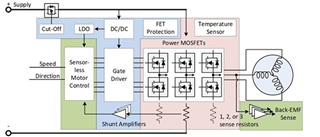2-coil fan driver, power consumption
Time:2023-10-05
Views:644
This application note introduces how to determine the power consumption of a Melexis two coil fan driver integrated circuit. This document will discuss power factor, calculations, and calculation examples, as well as different methods for scenarios where the results exceed certain device specifications.
Power consumption factor
The total IC power consumption in a 2-coil fan driver is the sum of four main factors:
Static input power supply
Output driver ‘ON‘ status
Output switch loss
Logical output driver (depending on device - FG, RD, or none)
In the No-VD design, there is no direct VDD pin on the integrated circuit because the power supply voltage is restored through the closed output driver. This enables the device to be packaged into smaller packages. When the fan rotates normally, the output voltage of the driver when turned off is the sum of VDD voltage (applied to the common node of the coil) and the electromotive force (EMF) voltage naturally induced by the fan coil. EMF is a sinusoidal voltage, whose amplitude is proportional to the speed.
Figure 1 illustrates the output voltage shape during normal rotation and displays the EMF effect:

Due to the variation of the generated power voltage over time, the formula for calculating PSUP should be integral. However, we can simplify and avoid using integration by using a simple method to determine the resulting voltage.
What if the result exceeds the device specifications?
If the junction temperature required for calculation is higher than the rated value of the device (usually 125 degrees), it means that the application is unsafe: the device may be damaged, or some parameters may have significant drift, leading to application failures.
In order to operate under safe conditions, several possibilities can be explored:
Reduce the operating temperature range
Reduce output current by increasing the number of turns in the coil winding or using a smaller wire diameter
Improve the thermal resistance of packaging junctions to the environment.
The first two points are directly related to fan specifications and design. The third point can be achieved by using another package with better thermal performance or more accurately measuring the thermal resistance of the package in the customer system, as it depends on some variables, such as PCB type (single or multiple layers) and copper rail design as important factors. Important. However, an option is rarely used as it requires a longer research and development phase.
|
Disclaimer: This article is transferred from other platforms and does not represent the views and positions of this site. If there is any infringement or objection, please contact us to delete it. thank you! |











